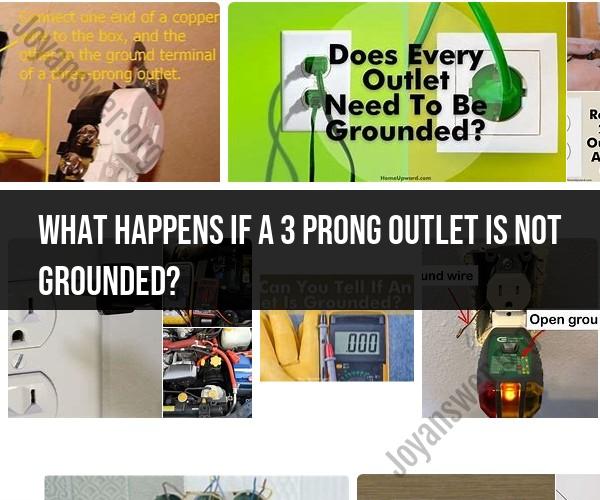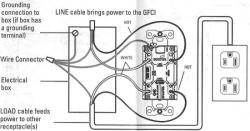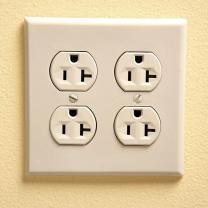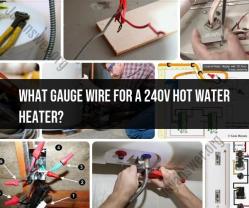What happens if a 3 prong outlet is not grounded?
If a three-prong outlet is not grounded, it can pose several potential issues, including electrical hazards and limitations on the types of appliances and equipment that can be safely used with the outlet. Here are some of the problems that may arise from an ungrounded three-prong outlet:
Electrical Shock Risk: Grounding is a safety feature that helps prevent electrical shocks. In the absence of a ground connection, there's an increased risk of electric shock if a fault occurs in the appliance or wiring.
Fire Hazard: Grounding also helps protect against electrical fires. Without proper grounding, faults or short circuits in electrical devices or wiring can potentially lead to overheating and fires.
Ineffective Surge Protection: Surge protectors rely on the ground connection to divert excess voltage safely away from your devices. An ungrounded outlet may render surge protection less effective, leaving your electronics vulnerable to power surges.
Limited Use of Appliances: Some appliances, particularly those with metal parts or cases, may require a grounded outlet to function safely. If your outlet is ungrounded, you may not be able to use certain appliances or equipment that have three-prong plugs.
Violation of Electrical Codes: In many regions, electrical codes require that outlets in homes and buildings be properly grounded for safety reasons. An ungrounded outlet may be in violation of local building codes.
Electromagnetic Interference (EMI): Grounding can help reduce electromagnetic interference, which can affect the performance of sensitive electronic equipment. Without proper grounding, you may experience interference issues with audio and video equipment.
Solutions to Address an Ungrounded 3-Prong Outlet:
Install Ground Fault Circuit Interrupters (GFCIs): Consider installing GFCI outlets or breakers in locations where you cannot easily add a ground wire. GFCIs provide an added layer of protection against electric shock and can be used in place of grounded outlets in some cases.
Rewire and Add Grounding: If possible, the best solution is to have a qualified electrician rewire the circuit and add a ground wire to the outlet. This ensures that the outlet is properly grounded and meets safety standards.
Use Two-Prong Adapters with Caution: While not a recommended long-term solution, you can use two-prong to three-prong adapters to power devices that have three-prong plugs. However, this does not provide grounding and should be used with caution.
Consult an Electrician: If you are uncertain about the grounding status of your electrical outlets or are experiencing issues, it's advisable to consult a licensed electrician. They can assess your electrical system and recommend the best course of action to ensure safety and compliance with local electrical codes.
In summary, an ungrounded three-prong outlet can pose electrical safety risks and limit the functionality of certain devices. It's important to address this issue to ensure the safety of your electrical system and equipment. Always consult a qualified electrician for any electrical work or modifications to your home's wiring.
Ungrounded 3-Prong Outlets: Risks and Consequences
Ungrounded 3-prong outlets are a common electrical hazard in older homes. These outlets have three prongs, but the center prong, which is the grounding prong, is not connected to a ground wire. This means that there is no path for electricity to escape in the event of a short circuit or overload.
This can pose a number of risks, including:
- Electric shock: If a person touches an appliance that is plugged into an ungrounded 3-prong outlet and there is a short circuit, the person could receive an electric shock. This can be very serious, and even fatal in some cases.
- Fire: If a short circuit or overload occurs in an ungrounded 3-prong outlet, it could start a fire. This is because the electricity will have nowhere to go and could build up heat, which could ignite flammable materials nearby.
- Damage to appliances: Ungrounded 3-prong outlets can also damage appliances. This is because the electricity can surge through the appliance, causing components to overheat or fail.
The Importance of Grounding: What Happens with Ungrounded 3-Prong Outlets
Grounding is an important safety feature in electrical systems. It provides a safe path for electricity to escape in the event of a short circuit or overload. This helps to protect people from electric shock and fires.
When an appliance is plugged into an ungrounded 3-prong outlet, there is no safe path for electricity to escape in the event of a short circuit or overload. This means that the electricity could flow through the appliance and to the person touching it, causing an electric shock.
It is important to note that ungrounded 3-prong outlets may not always appear unsafe. They may look and function the same as grounded outlets. However, it is important to have an electrician inspect your outlets to make sure that they are properly grounded.
Electrical Safety Compromised: Addressing Ungrounded Outlets
If you have ungrounded 3-prong outlets in your home, it is important to have them grounded by a qualified electrician. This is a relatively inexpensive and simple procedure.
Another option is to replace ungrounded 3-prong outlets with 2-prong outlets. This is a more involved process, but it may be necessary if the wiring in your home is not compatible with grounding.
In the meantime, there are a few things you can do to reduce the risks associated with ungrounded 3-prong outlets:
- Avoid using appliances with 3-prong plugs in ungrounded outlets. If you must use an appliance with a 3-prong plug in an ungrounded outlet, use a ground fault circuit interrupter (GFCI) outlet. A GFCI outlet will shut off the power if it detects a ground fault, which can help to prevent electric shock.
- Inspect your cords and plugs regularly for damage. If you see any damage, replace the cord or plug immediately.
- Do not overload outlets. Only plug one high-wattage appliance into an outlet at a time.
By taking these precautions, you can help to protect yourself and your family from the risks associated with ungrounded 3-prong outlets.










